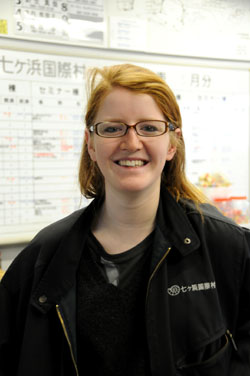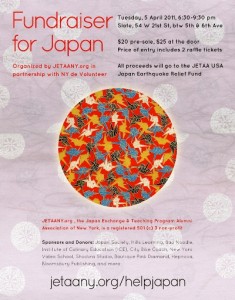Sankei Shimbun article about Taylor Anderson
Thanks to JETAA Music City President Terry Vo for sharing this an very moving article (in Japanese) written by Yoshihisa Komori about Taylor Anderson. Komori-san went to visit Taylor’s parents for the interview.
Update 05/10/11: Thanks to Jo McCarthy (Shimane-ken, Okuizumo-cho) of the JET Alum Translators/Interpreters group on LinkedIn for providing an English translation.
“The death of a woman who loved Ishinomaki”
by Yoshihisa Komori; translated by Jo McCarthy (Shimane-ken, Okuizumo-cho)
http://sankei.jp.msn.com/world/news/110504/amr11050402570003-n1.htm
I was immediately reminded of the old film “Gone With The Wind.”
This was because the large mansion I arrived at after leaving the extensive lush green woods had white pillars and a porch, which rose elegantly in the traditional style of the southern United States. At the rear of the residence, the green gently sloping gardens extended as far as the James River.
Why, I wondered, would a young American woman who grew up in an environment such as this, be fascinated by the town of Umibe in the Tohoku region of Japan?
This was the house of the parents of Taylor Anderson – the English teacher who was caught in a tsunami in Ishinomaki City, Miyagi Prefecture, following the Great East Japan Earthquake of March 11, and died.
It’s in the quiet hills on the outskirts of Richmond, capital of the state of Virginia.
In the spacious living room Taylor’s father Andy, who manages a real estate company, and her mother Jean, a housewife, (both 53) spoke quietly of their thoughts about their eldest daughter, who was 24 years old.
“Taylor learned Japanese history at elementary and junior high school from the same teacher, and became fascinated by Japan. Her teacher was an American, but they had been brought up in Japan, so also taught our daughter Japanese language and culture. It became our daughter’s dream to live and study in Japan.”
“Taylor liked Japanese anime and the novels of Haruki Murakami,” Andy adds to Jean’s explanation. “She seemed to love the elegance and subtleness of Japanese culture. And also often said she really liked the settled order and politeness, a unique character of Japanese society.”
Soon after graduating university, Taylor applied for and was accepted on the JET Program (a program open to foreign youth), and in the summer of 2008 moved to Ishinomaki. She taught English at 7 elementary schools in Ishinomaki, and the story of how she was loved by her students has even been reported in detail in this newspaper.
On the day of the earthquake, after ensuring that her students had been picked up by their caregivers, Taylor was heading home as usual on her bicycle.
However, Taylor went missing.
Her parents desperately made contact with a number of people in Japan. They heard she had been reported as having been found safe, but were unable to confirm it. Andy decided to go and search for Taylor with her boyfriend James.
On the day of their departure, March 21, about 2 hours before they planned to leave for the airport, they received news from the US Embassy in Tokyo that her body had been positively identified.
“It feels as though Taylor’s death has opened a hole in our hearts. But she would not want that for her parents. She was a person who always looked positively to the future, and made things enjoyable just by being there”.
As the first tears began to fall, Jean told how Taylor had planned to return to the US in August this year to get engaged to James, and to either start postgraduate study or look for Japan related work.
Well then, wouldn’t it have been better if she had ended her time in Japan after 2 years, and returned home last year?
However, Jean promptly replied “No. I visited Ishinomaki myself for about 5 days in spring last year, and was able to understand completely why my daughter wanted to be there long term. She was happy doing what she most wanted to do.”
The Andersons, in collaboration with their daughter’s alma mater St. Catherine’s High School, have started a foundation named the Taylor Anderson Memorial Fund. So far, around $90,000 has been raised.
In accordance with Taylor’s wishes, all proceeds from the fund will be directed toward the restoration of Ishinomaki City’s elementary and junior high schools.
See below for the foundation’s website.
Translated by Jo McCarthy
【朝刊 1面】 ■【あめりかノート】ワシントン駐在編集特別委員・古森義久
■石巻を愛した女性の死
古い映画の「風と共に去りぬ」を一瞬、連想した。緑豊かな広大な林を抜けて着いた大邸宅
にはいかにもアメリカ南部ふうの伝統的な白い円柱とポーチが優雅にそびえていたからだ。邸宅の裏には緑の庭がジェームズ川の岸までなだらかに延びていた。こんな環境で育った若い米国人女性がなぜ日本の東北の海辺町に魅せられたのかと、いぶかった。
東日本大震災の3月11日、宮城県石巻市で津波に巻き込まれて亡くなった英語教師の
テー ラー・アンダーソンさんの両親が住む家だった。バージニア州の州都リッチモンド郊外の閑静な丘陵である。 不動産会社を経営する父親のアンディさん、専業 主婦の母親のジーンさんはともに53歳、ゆったりとした居間で24歳だった長女、テーラーさんへの思いを穏やかに語った。
「テーラーは小中学校で同じ先生から日本の歴史を学び、日本に魅せられたのです。そ
の先生はアメリカ人ですが、日本で育ち、日本の言葉や文化までを娘に教えてくれました。日本に住んで学ぶことが娘の夢となったのです」
ジーンさんのこんな説明にアンディさんがつけ加える。
「テーラーは日本のアニメや村上春
樹の小説が好きでした。日本の文化の優雅さや繊細さを愛したようです。そして一定の秩序や礼節という日本社会の特徴も大好きだとよく話していました」
テーラーさんは大学卒業後すぐに日本のJETプログラム(外国青年招致事業)に応募して
採用され、2008年夏に石巻に赴任した。石巻では小中学校計7校で英語を教え、生徒たちに愛されていた様子は本紙でも会田聡記者が詳しく報じた。大震災の日も彼女は生徒たちが保護者に引き取られるのを見届けてから、自転車で自宅へ向かったという。
だがテーラーさんは行方不明になった。両親は米国から必死で日本の多方面に問い合わせ
た。 無事でみつかったという情報も流れたが、確認できなかった。アンディさんはテーラーさんの恋人のジェームズさんと捜索に出かけることを決めた。その出発の 日の3月21日、空港へ向かう予定の2時間ほど前に東京の米国大使館からテーラーさんの遺体が確認されたという通報があった。
「テーラーの死で私たちの心は穴があいた感じです。でも彼女自身は両親にそんなことは
望まない。彼女は前向きで明るく、ともにいるだけでこちらが楽しくなる子でした」
ジーンさんは初めて涙をにじませ、テーラーさんが今年8月には米国に帰り、ジェームズさ
んと婚約し、大学院か日本関係の職業を目指すことを決めていたのだと告げた。では日本滞在を2年ですませ、昨年帰国してもよかったのではないか。
だがジーンさんは即座に答えた。 「いいえ、私自身、昨年春に石巻を5日ほど訪れ、娘が
なぜそこに長くいたいか体全体で理解できました。自分が最もしたいことをしていた彼女は幸せだったのです」
アンダーソン夫妻は娘の母校セント・キャサリン高校と協力して「テーラー・アンダーソン追
悼基金」という募金を始めた。これまでに9万ドルほどが集まった。基金は故人の遺志を体してすべて石巻市の小中学校の復旧に充てる。同基金のサイトは以下だという。
Burger King Japan’s “Meat Monster” reviewed by JET writer for Esquire Magazine
Current Mie JET Patrick St. Michel shared the below about his recent “Meat Monster” review in Esquire Magazine, which JETwit believes is very much worth your time to read.
An Unexpected Burger Benefit of Life in Japan
Posted by Patrick St. Michel (Mie-ken, 2009-present).
Having now lived in Japan for nearly two years, I’ve discovered a host of benefits—from convenient public transportation to a copious amount of vending machines—that come with residing in this island nation. Recently, however, I encountered a completely unexpected benefit—one that involved consuming—in a single sitting—the FDA-recommended caloric intake for a herd of plus-size elephants.
Prior to joining JET, I attended—and graduated from—Northwestern University’s Medill School of Journalism. My pre-JET life also included working at three newspapers, an online music site, and an online magazine that I co-founded (http://www.northbynorthwestern.com). One of the friends I made along the way now works at Esquire magazine. Word had apparently spread stateside that Burger King Japan was launching a medically ill-advised burger aptly dubbed the “Meat Monster.” Knowing that I live in Japan and generally don’t give much thought to my arteries’ continuing ability to function, my friend asked if I would write a review of the Meat Monster for Esquire. Fortunately, I had inadvertently prepped for this unexpected assignment, having just reviewed McDonald’s “Mega Teriyaki” in my blog about life in Japan—http://www.japantrick.wordpress.com/. (I’ve also previously reviewed McDonald’s line of Big America burgers)
Some 1,160 calories and 2,290 milligrams of sodium later, I filed my Esquire story—http://www.esquire.com/blogs/food-for-men/burger-king-meat-monster-042611
As a postscript, my plan is to pursue a post-JET writing career in Japan. Toward that end, if anyone has suggestions—or knows of openings at traditional or online publications or public relations/marketing positions—I would love to hear from you! Reach me at mailto:patrickstmichel@gmail.com. If you’re still not sure about me, learn more at http://www.patrickstmichel.com, and if you’re interested in the Japanese music scene, follow my blog—http://www.makebelievemelodies.wordpress.com/.

Jim Gannon (Ehime-ken, 1992-94), Executive Director for the Japan Center for International Exchange.
By Renay Loper (Iwate-ken, 2006-07). Renay is a freelance writer and international education professional currently seeking FT opportunities. Visit her at Atlas in Her Hand.
JET alum Jim Gannon (Ehime-ken, 1992-94) is the executive director of the Japan Center for International Exchange in New York. A Columbia graduate who previously worked for the for the Japan Bank for International Cooperation, he penned last year’s “JET Program on the Chopping Block” article, which helped alert and educate JETs and JET alumni to the threats facing the future of the JET Program. Since then, he has served as an invaluable resource to the JET Alumni Association, providing informal advice and perspective and serving on the JETAA New York Board of Directors.
How has your day-to-day work with JCIE been affected by the Tohoku catastrophe?
It has been a whirlwind since the morning of Friday, March 11, although fortunately all of our friends, family, and coworkers in Japan are safe. On the Japan side, JCIE has been working for decades to strengthen Japan’s nonprofit sector. That gives us a strong base of knowledge in this area, plus we have extensive experience channeling philanthropic contributions from overseas to Japanese organizations, and have also have been working closely for years with the country’s major humanitarian organizations, which have now mobilized to respond to the disaster. Meanwhile, on the U.S. side, JCIE is one of the few Japanese nonprofit organizations with a strong American presence which can receive tax deductible donations. This has put us in a unique position to be able to help.
On day one, we were asked to advise major U.S. humanitarian organizations trying to get into Japan to help, and we have since been working long hours to contribute on various fronts. To take advantage of our understanding of who is who in Japan’s nonprofit sector and the capacity to fundraise in the United States, we established a set of funds to aid Japanese nonprofits on the frontlines of the relief and recovery efforts. The amount of money committed to these by American donors has reached almost $2 million, and most of that is already reaching Japanese communities. The main fund, the Japan NGO Earthquake Relief & Recovery Fund, splits donations up 50-50 between immediate relief efforts and the types of long-term recovery efforts that are absolutely vital, yet typically underfunded, and we will be increasingly focusing on supporting the long-term recovery. In addition to this, we have also been working with a wide range of U.S. foundations, companies, and experts to discuss how to better coordinate the U.S. philanthropic approach to the Japanese disaster. So, my plate has been very full, but we felt we had an obligation to do this given our unique capacity in this area.
What is the mood of the country, generally speaking, since the events?
Difficult to answer, since I have not been there since the disaster. However, my conversations with colleagues and friends indicates that, while people are on edge due to the continuing aftershocks and the radiation risk, there is a deep conviction of the need to rebuild, and extraordinarily selfless efforts by people from all over Japan to do what they can to help. But I can’t talk definitively on the mood from my own experience.
What are JCIE’s priority areas for rebuilding?
In terms of short-term relief efforts, it is critical to empower communities in Japan to help themselves, and this becomes even more important when talking about the long-term recovery. It is essential for local nonprofit organizations—a group that extends far beyond the Red Cross—to be able to play roles if communities are going to be equipped to rise to this challenge. But Japan’s philanthropic sector is weak, and government and business often overlook the nonprofit sector in Japan. This is why we are placing priority on getting funding and other support to a wide range of organizations that are Japanese-run and that are truly nongovernmental and nonprofit in nature.
Justin’s Japan: Interview with Author Arudou Debito on His Debut Novel “In Appropriate”

"I’m told Debito.org remains the resource for many JET Program participants looking for advice or needing an alternative perspective on Japan. See my speech to HAJET in 1999 on 'survival strategies in Japan,' which has apparently been reprinted in several JET publications." (Arudou Debito)
By JQ magazine’s Justin Tedaldi (CIR Kobe-shi, 2001-02) for Examiner.com. Visit his page here to subscribe for free alerts on newly published stories.
Divorce is tough, but divorce in Japan—especially if you’re a foreigner with kids—is a nightmare, explains Sapporo-based author Arudou Debito in his new book, In Appropriate: A Novel of Culture, Kidnapping, and Revenge in Modern Japan.
Originally raised in rural upstate New York as David Aldwinckle, Debito is a 23-year resident of Japan who obtained Japanese citizenship (and a name change) in 2000. As the Just Be Cause columnist at The Japan Times newspaper, his nonfiction books include Handbook for Newcomers, Migrants, and Immigrants, and Japanese Only: The Otaru Hot Springs Case and Racial Discrimination in Japan.
A longtime watchdog for foreigners’ rights in Japan, Debito’s first English-language novel takes a scalpel to the polite, friendly façade that tourists typically experience. In Appropriate examines the downright ugly aspects of Japanese life when a father is cut from all ties with his children post-divorce, which is not only common in Japan, but upheld by 19th century law. In this exclusive interview, Debito discusses his personal experiences that inspired the book, his history as an activist, and his thoughts on the future of Japan.
You’ve been known as an activist for over a decade and have published non-fiction works on the subject. What inspired you to write about child abduction in Japan, and what were your goals?
My goal with In Appropriate was to expose a dire social problem, as usual. But this time I thought fiction would be the better medium. Doing what I do, I hear a lot of stories about broken marriages in Japan, and having gone through a nasty divorce myself (seeing my children only about six times since 2003), I know a little bit about child abduction. What goes on in Japan beggars belief, but it’s hard to zero in on one non-fiction case and expect it to cover the scope of the problem.
Although international child abductions in other countries have gotten some press, the situation in Japan is much, much worse. Child abductions and parental alienation in Japan are, in a word, systematic—meaning they are hardly uncommon between Japanese, too (former prime minister Junichiro Koizumi is a famous example; he never saw one of his sons for nearly two decades). One parent after a divorce is generally expected to disappear, and have little to no contact with the children anymore. In Appropriate was meant as a primer to the issue.
Japanhas no system of joint custody or guaranteed visitation rights, and under this system I cannot recommend anyone, Japanese or non-Japanese (NJ), get married under it and consider having children. The risk is too great. We need fundamental reform of the Family Registry System and the laws governing divorce and child custody first.
Give us a basic overview on the phenomenon of kidnapping and left-behind parents in Japan.
It works like this: Japan’s divorce laws have been fundamentally unaltered since 1898(!), meaning modern-day common-sense divorces based upon “we just don’t like each other any more,” aka “irreconcilable differences,” don’t fly in Japan’s Family Courts. Fact is, if both sides don’t agree to a divorce, one side will have to portray the marriage as a living hell (even when it wasn’t) in public just to satisfy the requirements, inspiring vindictiveness in the other side. (Read more at www.debito.org/thedivorce.html.)
So after a successful split, one parent (usually the mother) gets the kids, and they are put on her Family Registry (koseki). Hers only, as Japan’s laws do not permit registry of people on two koseki. This means the other parent (usually the father) has no title or custody to the children (for example, I couldn’t even get an audience with my daughters’ junior high school teachers to see their grades). Access is granted only at the whim of the mother; I haven’t so much as seen a new photograph of my kids for about five years now. Even if the father goes to court to get a ruling guaranteeing visitation or access, if the mother again decides to make excuses for denial of visitation (or worse yet, levies a claim of “domestic violence”), the father will have to go to court again to get his rights enforced. Given that Japanese courts take months or years to hand down decisions, his kids will in the interim grow up alienated and never hearing his side.
This is what happens on a domestic level between Japanese. Now add the dimension of international marriage, where the NJ parent may have visa issues, face a language/culture barrier, or be communicating from overseas, and you have a more complex case. (More information via the Children’s Rights Network at www.crnjapan.net.)
Why did you choose the fiction novel format?
Because no single non-fiction case would capture the complicated dynamics of this issue properly. Besides, In Appropriate is about more than just divorce: I wanted to describe how a person would find a fascination in Japan and Japanese people, come over during Japan’s Bubble Era to see Japan ripe with opportunity, and find how Japan went sour as an economy over the past two decades. It was wonderful for me to recount this as a Bubble Era veteran—when in the late 1980s Japan looked poised to take over the world, was even challenging notions of how capitalism worked. Then see how, step-by-step, Japanese society would be squeezed and squeezed, convinced that recovery was right around the corner, just like Godot. How a person could become an immigrant to Japan—assimilating himself to the point of founding his own company, becoming bilingual in Japanese, even taking Japanese citizenship, yet be blindsided by events that were nearly always beyond his control. In Appropriate is much more than just a story of divorce—it’s a time capsule charting Japan’s descent into mediocrity and comparative international irrelevance. That’s best portrayed in a novel format.
What are some of your proudest moments at Debito.org since it went online, and why?
After a quiet start in 1997, Debito.org has been one damn issue after another. But in terms of sustainability, I gave a running commentary on the Otaru Onsens Case (www.debito.org/otarulawsuit.html) nearly weekly, sometimes daily, for four years; Debito.org as a source received enormous international media attention. Then Debito.org converted to a daily blog in 2006; I’ve done 2,000 more essays since (which means a total of probably about 5,000 archival materials by now).
I’m told Debito.org remains the resource for many JET Program participants looking for advice or needing an alternative perspective on Japan (see my speech to HAJET in 1999 on “survival strategies in Japan,” which has apparently been reprinted in several JET publications, at www.debito.org/HAJETspeech.html). Debito.org has been the launching pad for many a major media news story, in Japanese, English, and several other languages. It’s given a modicum of credibility to the oft-shaken belief that “the debate in Japan about internationalization and immigration” still exists unabated.
For the complete interview, click here.
Fukushima Publishes “United We Stand” Newsletter
Via CLAIR New York’s Japan Local Government Center, here’s a special English-language newsletter from the Fukushima government about the current situation there. Read the inaugural issue at www.jlgc.org/pdfs/jp/20110501Fukushima.pdf.
Justin’s Japan: Interview with “Japanamerica” Author/JET Alum Roland Kelts on “Monkey Business”
By JQ magazine’s Justin Tedaldi (CIR Kobe-shi, 2001-02) for Examiner.com. Visit his page here to subscribe for free alerts on newly published stories.
Taking its name from the immortal Chuck Berry tune, the debut English-language edition of Monkey Business: New Voices from Japan is based on the annual Tokyo-based Japanese literary magazine founded in 2008 by award-winning translator, scholar, editor and author Motoyuki Shibata, one of Japan’s best known and most highly regarded translators of American fiction. The first installment offers poetry, Kafka-adapted manga, a wide-ranging, in-depth interview with Haruki Murakami, and much more. And despite its mischievous title, twenty-five percent of all Monkey Business sales will go toward the Nippon Foundation/CANPAN Northeastern Japan Earthquake and Tsunami Relief Fund.
Roland Kelts (Osaka-shi, 1998-99) is the author of 2006’s Japanamerica: How Japanese Pop Culture Has Invaded the U.S. and a curator and editor for Monkey Business. A weekly columnist for The Daily Yomiuri, commentator for National Public Radio, and teacher of Japanese popular culture at New York University and the University of Tokyo (he splits his time between both cities), Kelts is back in town this week for the new book’s launch, beginning April 30 at Asia Society, May 1 at BookCourt in Brooklyn, and May 3 at Japan Society. I caught up with Kelts during his recent appearance at Seattle’s Sakura-Con for this exclusive interview.
How did you get involved as an editor and curator for this book?
My dear friend, Motoyuki Shibata, Japan’s premier translator of American literature, talked to me two years ago about publishing an English-language version of Monkey Business, his literary magazine. As an editor at A Public Space, a literary magazine based in Brooklyn, I was keen to build another bridge between the two countries. I talked at length with Brigid Hughes, the founding editor of A Public Space, and she was interested. Then we received a grant from the Nippon Foundation, and the Japan Foundation, the Asia Society and the Japan Society all supported our project. I am deeply grateful to all parties involved.
What can readers expect from the book?
The freshest, newest, most exciting contemporary literature, poetry and manga from Japan, plus some American voices, like Barry Yourgrau, who have emerged as major American authors in Japan.
How did you select the pieces to be selected for the English version?
Motoyuki Shibata, Ted Goosen and major translators like Jay Rubin (Haruki Murakami’s translator) and Michael Emmerich all created the final manuscript. Shibata and Goosen then sent it to me and Brigid Hughes, and we had several conversations in order to select the best material for an American readership.
What are the biggest challenges of translating and editing Japanese creative writing into English?
It’s not as simple as it sounds. You need to choose the material that will speak to American readers, who, after all, are limited and defined by their cultural context. Not every successful book in Japan will speak to American readers. You need cultural authorities on both sides of the Pacific Ocean to make a valuable publication.
You’ve been working on a novel of your own called Access for years now. What can you tell us about it, and how’s it coming along?
Very close to completion. I think it’s a masterpiece, but I’m partial, of course. It’s a cross-cultural narrative built upon sex and longing—both close to my heart.
As a participant of Japan’s international exchange-based JET Program, what were your biggest takeaways from your experience that you’ve applied to your career today?
I learned how to live and work in Japan—an invaluable lesson.
Read the rest of the interview here.
JQ Magazine: JQ&A with Tomoya Suzuki of CLAIR New York’s Japan Local Government Center
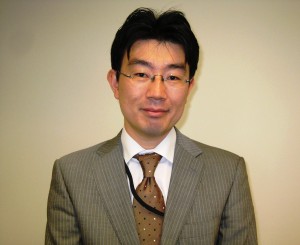
“As a staff member at the JLGC, working with the JET Alumni Association is my first and foremost top accomplishment. I have been able to learn how a volunteer group works in American society, and I am impressed by the alumni’s passion and devotion for its activities to be a bridge between the U.S. and Japan.” (Justin Tedaldi)
By Renay Loper (Iwate-ken, 2006-07). Renay is a freelance writer and international education professional currently seeking FT opportunities. Visit her at Atlas in Her Hand.
I recently had the pleasure of doing a brief Q&A with Mr. Tomoya Suzuki of the Japan Local Government Center (JLGC), CLAIR’s New York branch office dedicated to international exchange and mutual understanding between the U.S. and Japan. Suzuki-san has been working with the JLGC in New York since April 2010 through a temporary overseas assignment with the Tokyo Metropolitan Government (TMG). Suzuki-san lives in New York with his wife and son.
Tell us a little about yourself.
I was born and raised in Chiba Prefecture and moved to Tokyo soon after I started working for TMG. I came to New York for the first time in April 2010, so I have been here for just one year. I am so happy and proud to be living and working in this exciting city!
You are an assistant director at the JLGC. What is your primary focus?
I would say my foci are as a staff member of the JLGC and as a representative of TMG. As a staff member of the JLGC I want to tell Americans, especially local governments, the good points about Japan and its people. As a representative of TMG, I want to facilitate the relationship between Tokyo and New York City, who have one of the oldest sister city relationships—it has been in existence since 1960. Read More
Justin’s Japan: This week’s Nippon in NY events: NY Loves Japan, Japan-a-Mania, Sakura Matsuri
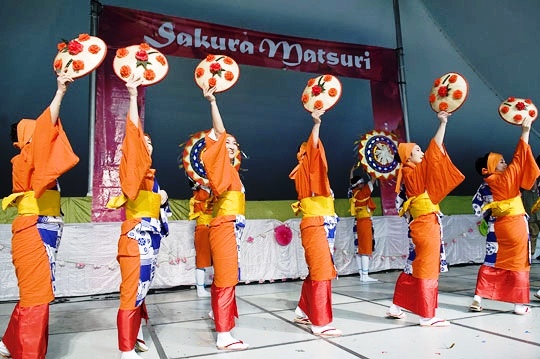
The Japanese Folk Dance Institute of New York joins a superb lineup of peformers at the Sakura Matsuri festival at Brooklyn Botanic Garden this weekend, April 30-May 1. (Jason Gardner)
By JQ magazine editor Justin Tedaldi (CIR Kobe-shi, 2001-02) for Examiner.com. Visit his page here to subscribe for free alerts on newly published stories.
After all those April showers, it’s finally starting to feel like spring. And what better way to welcome those May flowers than with these events, capped off with the 30th(!) annual edition of a Brooklyn Botanic Garden classic.
Wednesday, April 27, 2011, 7:00 p.m.-10:00 p.m.
269 11th Avenue (between 27th and 28th Streets)
Tickets: $100 general admission/$175 VIP (click here for VIP details)
The New York Sake and Japanese Food Community has joined together with non-profit volunteer organization Project by Project to organize a fundraising event to support disaster relief in Japan in the wake of the Tohoku earthquake and tsunami. New York’s leading Japanese food and sake distributors, chefs, restaurants (including Bao Noodles, owned by JET alum Chris Johnson (Oita-ken, 1992-95), who also helped organized the event), food writers, public relations companies, and cooking schools have come together to form NY Loves Japan. Help spread the word through their Twitter and Facebook pages as well.
Saturday, April 30, 12:30 p.m.-4:30 p.m.
Japan-a-Mania
Big Brothers Big Sisters of New York City
223 E 30th Street (between 2nd and 3rd Avenues)
Free to volunteer. RSVP to Katrina Barnas
Back by popular demand! Join fellow members of the JET Program Alumni Association of New York as they teach NYC kids about Japanese culture in partnership with Big Brothers Big Sisters and NY de Volunteer. Step up to show off your origami, katakana or kimono-tying skills, or help with crowd control and meet new friends. Last year’s event drew over 60 kids with their bigs, and even more are expected this year. Also welcome are planners and anyone who can provide contacts for or perhaps lead a karate demonstration.
Saturday, April 30-May 1, 11:00 a.m.-6:00 p.m.
Enter at 900 Washington Avenue (between Crown and Carroll Streets)
Tickets: $10/$15 general admission; free for children under 12 and BBG members
During this season celebrating its historic relationship to Japanese culture and horticulture, the Garden reflects on the recent tragic events in Japan, and invites visitors to find opportunities for contemplation amidst its flowering cherries, Japanese Hill-and-Pond Garden, the bonsai exhibition Graceful Perseverance, and more. Visitors will be invited to make an origami crane that will eventually join thousands of others sent to Japan as a gesture of support and unity.
Click here to learn more about the events.
Justin’s Japan: New York’s Blue Note Benefit for Japan concerts to stage two-night support stand
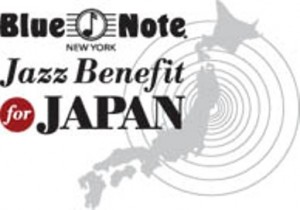
- The Blue Note Jazz Benefit for Japan concerts will be held at New York’s Highline Ballroom April 18-19. (Blue Note New York)
By JQ magazine’s Justin Tedaldi (CIR Kobe-shi, 2001-02) for Examiner.com. Visit his page here to subscribe for free alerts on newly published stories.
Japan has always been there for jazz. Now, jazz is giving back.
The Blue Note New York will host a harmonious benefit at Manhattan’s Highline Ballroom for two consecutive nights beginning Monday (April 18), with all of the ticket proceeds to be donated to the Japan Relief and Recovery Fund spearheaded by Direct Relief.
The event is being organized by talent buyer Seiko Kinoshita, who has worked at Blue Note New York since 1996. “As the details of the disaster unfolded, I felt sad and frustrated that I couldn’t do much to help, being so far away from my home country,” said the Fukuoka native. “Having worked in the jazz industry for most of my adult life, I decided to organize a benefit concert and was very encouraged by the willingness of the artists, as well as their agents and managers, to support the event. I believe that every little bit helps, and I want the Japanese people to know that New Yorkers and the jazz community care deeply about them and their country and want to do what they can to help.”
For the last 23 years, Blue Note has maintained clubs in multiple Japanese cities, with current establishments in Tokyo and Nagoya. Ron Carter, the distinguished jazz bassist who will be among the all-star musicians at Highline on April 19, wrote of his concerns and appreciation for the Japanese people: “We share the grief of the enormous loss of life and displacement of the Japanese people. I will pray for Japan’s fast recovery and will do everything in my power to help. The Japanese jazz fan is the most important supporter of my music, and I am always grateful for the years Japan has stood by my side.”
Click here for the complete story.
Foreign correspondents start “No. 1 Shimbun” to cover Tohoku disaster
Thanks to JET alum Emily Metzgar, Assistant Professor at Indiana University’s School of Journalism, for sharing the link to the new publication No. 1 Shimbun, published by leading foreign correspondents in Japan.
CLICK HERE for the April 2011 Special Issue.
Justin’s Japan: One month after the Tohoku Earthquake, New York offers more Japan benefit events
By JQ magazine’s Justin Tedaldi (CIR Kobe-shi, 2001-02) for Examiner.com. Visit his page here to subscribe for free alerts on newly published stories.
The massive aftershocks reported in Japan earlier today symbolized the island nation’s continued appreciation of support from around the world one month after the Tohoku Earthquake. Here are some of this week’s benefit and lecture events in New York.
Monday, April 11, 2:00 p.m.-9:00 p.m.
Japan Earthquake and Nuclear Crisis Relief Exhibition
Featuring artist talk “Dialogue with Mariko Mori and Ingo Günther” moderated by Reiko Tomii and live performances
Gallery 61, New York Institute of Technology, 16 West 61st Street. 11th floor
Donations welcome
Just one month ago, the 2011 Tohoku earthquake and tsunami and aftermath rocked the nation of Japan. The death toll is still climbing, with over 10,000 people who lost their lives, and almost 20,000 people reported missing. Over 300,000 people lost their homes and are now living without adequate food and water. Millions of people are living with anxiety and fear of being exposed to the dangers of raising radioactive levels. And their struggles are far from over.
We Are One features artwork donated by Japanese artists living in New York to support the people in Japan. Their mission is to raise money to help with the relief efforts of the Japan earthquake and nuclear crisis, spread awareness of what has happened, and what we can do among the international community. On display are donations from approximately 100 professional Japanese artists living in New York in painting, drawing, mixed media, prints, and photography. All donated artwork will be sold at a reasonable price of $100-$200. All proceeds will go to Japan Society’s “Japan Earthquake Relief Fund.”
Tuesday, April 12, 7:00 p.m.-9:00 p.m.
iNFiNiTY cooperation cross-cultural mass choir performance
Lt. Joseph P. Kennedy Center, Lower Auditorium
34 West 134th Street(Between Lenox and Fifth Avenues)
Donations welcome
“Don’t Give Up” is a song written by the American gospel composer Danny Eason. It was recorded by Eason in Japan in 2010 with Japanese blind artist Kohshi with the Japanese choir Gospel Now Japan. For this special charity rehearsal event managed by NY Hallelujah Company LLC, you can join the choir for Japan and sing with the group, raising your voice for Japan and encouraging its people. All voices and all musicians are welcome, prior to an upcoming performance in May with Eason.
According to the Japanese Red Cross, over $223,000,000 in donations were received in just one week from Japan’s friends overseas and from corporations. Over 20,000 people have been rescued by the Japanese Ministry of Defense and they are trying to save even more lives. Over 10,000 lives have been lost, but the number of victims will continue to rise with an additional 18,000 people unaccounted for, and 240,000 people have been forced to leave their homes to stay in temporary shelters. To participate, contact project leader Ms. Kyoko Uchiki at NYHCLLC[at]gmail.com or (212) 996-4302. For additional information, visit www.myspace.com/dont-give-up.
Tuesday, April 12, 8:00 p.m.-12:00 a.m.
Featuring The Orion Experience
Brooklyn Bowl
61 Wythe Ave.(between N 11th & N 12th Streets)
$10 suggested donation, 18+ only.
The critics are raving about The Orion Experience’s upcoming EP NYC Girl. USA Today says it “recalls ’70s-era Electric Light Orchestra,” while Time Out New York exclaims “The Orion Experience…impresses with its buoyant, hooky tunes, making awesome use of a coed tag-team vocal approach on a new EP.” The band also recently released their song “Nippon Ga Dai Suki (Japan We Love You)” for the first time in the U.S., with all proceeds from purchases via CDBaby and iTunes going to The Jewish Federations of North America’s Japan Relief Fund.
For a complete listing, click here.
There’s a very thoughtful article titled “This is what public diplomacy looks like“ by JET alum Emily Metzgar, Assistant Professor at Indiana University’s School of Journalism, on the Center for Public Diplomacy blog (which is part of the University of Southern California’s Annenberg School of Communications). (This is the same Emily Metzgar conducting the Survey of American Alumni of the JET Program.)
Here’s an excerpt that captures the gist of the piece, namely that JET is providing Japan with a significant “return on JET-vestment“:
“But in the aftermath of Japan’s devastating earthquake and tsunami, the value of having a large, worldwide network of college-educated foreigners who understand, respect and appreciate Japanese society and culture continues to emerge. A look at a JET alumni networking website, JETwit.com, provides ample evidence of the many ways in which current and former JETs are responding in whatever ways they can to the disaster hitting a country that all of them, at one time or another, have called home.”
CLICK HERE to read the full article.
*************
Here’s an April 7 Japan Times article about Marti McElreath (CIR Miyagi-ken, Shichigahama-shi).
JET post best, not ‘pityfest’
American helps, refuses to leave beloved, battered beach locale
Thursday, April 7, 2011
SHICHIGAHAMA, Miyagi Pref. — There is a picture folder in Marti McElreath’s Facebook account that chronicles her time in Shichigahama, a town located on a small peninsula in Miyagi Prefecture less than an hour’s drive from Sendai and where she has been working since last summer under the Japan Exchange and Teaching Program.
Her comment on the folder reads: “I have the best JET placement in Japan,” a view McElreath hasn’t changed despite the massive earthquake and tsunami that brutally transformed the once peaceful beach community she has come to love.
“I mean, it’s heartbreaking and hard to see what happened, but people are laughing and kids are playing and life is going on. Even after all that’s happened, I still believe it, I believe that I have the best JET placement in Japan,” she said.
While radiation fears from the Fukushima No. 1 nuclear power plant have led many foreigners in the region to flee, McElreath, who said the town lies on the cusp of the 80-km evacuation zone recommended by the U.S. government, has remained firm in her conviction to stay and do what she can to help the community.
“I’ve only been here for seven or eight months, but I really do love Shichigahama. The people here have been really amazing to me, and they’ve done so much to help me — I couldn’t imagine just leaving,” said McElreath, 23, from Westborough, Mass.
The earthquake and tsunami that hit the small town of 20,000 claimed 56 lives, and 18 people remain missing. Nearly 1,000 people were still living in the town’s six evacuation centers as of Tuesday, and many houses in the coastal area were swept away or damaged.
The facility McElreath works for, Kokusaimura, or International Village, is being used as a temporary shelter, providing food and a place to sleep for around 300 people, and McElreath spends her days helping out evacuees as the only foreigner among the staff.
According to the International Affairs Division of the Miyagi Prefectural Government, out of the 70 JETs in Miyagi — excluding those in Sendai — 36 have either returned to their homeland or evacuated from the prefecture following the earthquake and subsequent nuclear disaster.
A municipal representative from Sendai said out of the 70 JET assistant-language teachers working in the city, 50 remained, and the rest planned to return before schools reopen Monday.
When the magnitude 9.0 earthquake hit at 2:46 p.m. on March 11, McElreath was at her office at Kokusaimura, going about her usual business.
As a coordinator for international relations, McElreath, fluent in Japanese after studying as an exchange student in Kobe during high school and then at Tohoku University during her senior year in college, was responsible for organizing various community events the facility hosted, as well as giving English-language and culture classes to local residents.
Without warning, the earthquake cut off the lifelines at the facility, and while sirens blared out tsunami warnings, people began evacuating to Kokusaimura, which sits on a hill.
McElreath said no one at the facility at that point was aware of the scale of the tsunami that was about to crash into the peninsula. By the time emergency electric generators were able to re-connect television sets, evacuees were confronted with horrific images of the disaster.
“I think it was around that point that we realized that we were going to be here for a while,” she recalled.
Then at around 6 or 7 p.m. a huge explosion shook the facility and its residents as the JX Nippon Oil & Energy Corp.’s Sendai oil refinery, located a few kilometers from Shichigahama, went up in flames.
“The entire sky went red, and everyone gathered around the windows and looked outside and it was, like, an inferno,” McElreath said, adding the smoke from the refinery lasted two or three days.
While McElreath was able to notify a prefectural adviser of the JET program of her safety immediately after the earthquake, cell phone reception quickly died.
It was not until the third day after the earthquake that she rode her bicycle 6 or 7 km toward Sendai and her cell phone finally re-connected, allowing her to contact family and friends to let them know she was safe.
McElreath said that as the Fukushima nuclear disaster unfolded, many foreigners she knew in the region, including non-JETs and those from other nations, were contacted by their respective embassies and advised to evacuate.
“There are noticeably less foreigners, there is almost no one left that you can tell by just walking around,” McElreath said, adding she did not feel threatened by the radioactivity leaking in Fukushima.
“I decided that I would rather stay here as long as possible and keep on monitoring the situation,” she said, adding that while her parents are concerned for her safety, they understand her desire to remain and help the community.
While electricity returned about a week after the earthquake, and propane could be used, water remained undrinkable and was only restored Tuesday in some areas of town. McElreath said that while Kokusaimura was well stocked with food and drinking water, evacuees missed taking baths.
Meanwhile, McElreath said Plymouth, Mass., Shichigahama’s sister city, has been making fundraising efforts, already gathering $80,000 to be used in the town’s rebuilding. Teams from as far afield as Turkey have arrived on search and rescue missions, and various volunteers, including many celebrities, make the rounds to Kokusaimura to drop off goods and cheer up the evacuees.
McElreath has recontracted with JET until July 2012, and she is determined to stay and work — if the situation allows her to — for the entire duration.
“I’d like to let everyone know that the people here are positive and we don’t want this to become a pityfest.
“We are doing our best.”
Asahi article about JETAA NY Fundraiser
**************
Thanks to Kyushu-based professional translator Joel Dechant for alerting JEtwit to this article in Japanese on Asahi.com about Tuesday night’s JETAA NY Japan Fundraiser. My Japanese reading ability has weakened over the years, but it looks like I’m quoted at the end of the article. I think the other JET alum quoted is Ayelet Fogel (Sendai City, Miyagi-ken) who is in the photo. (And yes, that’s me in the background of the photo wearing my “JETAANY Nihongo wakaru yo!” t-shirt.)
If anyone would like to translate or summarize in English, please post as a comment or e-mail it to jetwit [at] jetwit.com.
English translation below by Lee-Sean Huang, webmaster of JETAANY and JETwit.
〈世界から被災地へ〉第二の故郷「ガンバ!」 元英語教師奔走
2011年4月7日10時25分
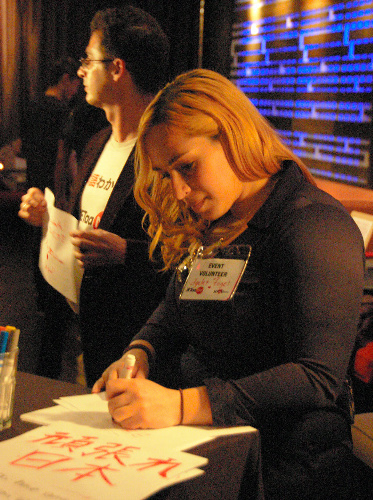 日本の高校や中学に派遣された米国の元英語教師が東日本大震災の被災者支援に奔走している。ニューヨークでは5日夜、義援金集めのパーティーがあり、多くの参加者が「第二の故郷」に思いを寄せた。
日本の高校や中学に派遣された米国の元英語教師が東日本大震災の被災者支援に奔走している。ニューヨークでは5日夜、義援金集めのパーティーがあり、多くの参加者が「第二の故郷」に思いを寄せた。
ニューヨーク州ロングアイランド出身のアイェレット・フォーゲルさん(31)は「3・11」の当日、仙台市の自宅にいた。家具が崩れ落ち外に飛び出した。
日本政府が英語指導の助手として招くJETプログラムで2003年8月から宮城県に滞在。3年の任期が終わっても宮城に残り、8年間で県内の七つの学校で教えた。現在は仙台育英学園の講師として働く。
最初の2年を過ごした南三陸町や気仙沼市では津波で家を流された友人も少なくない。釣りやサーフィンをし、親友と何度も通った美しい海岸は、がれきの山になった。宮城県石巻市では、JETのテイラー・アンダーソンさん(24)が犠牲になった。
仲間が大変なときに宮城を離れたくはなかったが、家族の懇願もあり先月18日に帰国。「米国でも出来ることがあるはず」と、義援金集めに走り回る。4月20日に学校が始まるのに合わせ、仙台に戻る予定だ。
1987年に始まったJETプログラムは、経験者が5万人を超える。
ニューヨークのパーティーには約300人が駆けつけ、約90万円が集まった。90年代に愛知県刈谷市に滞在したスティーブン・ホロウィッツさんによる と、米国各地で同様の動きがある。「私たちはどこにいても心の中では日本人。日本で過ごした日々への恩返しをしたいのです」(ニューヨーク=田中光)
<International responses to the Tohoku Earthquake>
Former English Teachers support their 2nd hometowns
April 12, 2011, 10:25
Former American English teachers who worked in Japanese junior high and high schools are organizing to support the victims of the recent eastern Japan earthquake. There was a fundraiser party in New York on the evening of April 5, where many participants came out in support of their “second hometowns.”
Ayelet Fogel (31 yrs/old), from New York’s Long Island, was at her home in Sendai City on the day of the “3/11” quake. She ran outside to safety as items in her home came crashing down.
Fogel has lived in Miyagi Prefecture since August 2003 when she was invited by the Japanese government to serve as an ALT (Assistant Language Teacher) on the JET Programme. After finishing her 3 year term, she remained in Miyagi and taught for 8 years at 7 schools in the prefecture. She is currently employed as an instructor at the Sendai Ikuei Gakuen.
In Minamisanriku Village and Kesennuma City, where Fogel spent her first 2 years in Japan, she has many friends whose houses were washed away by the tsunami. The beautiful coastline where she went fishing and surfing many times in the past with her friends has been turned into a mountain of rubble. JET participant Taylor Anderson, who was based in Miyagi Prefecture’s Ishinomaki City, died in the disaster.
Fogel did not want to leave her friends in Miyagi in a time of distress, but upon the request of her family, she returned to the US on March 18th. “I should be able to do something to help from the US as well,” she thought, and so began to collect donations for the disaster relief effort. She plans to return to Sendai in time for the beginning of the new school year on April 20th.
Founded in 1987, the JET Programme now has over 50,000 alumni.
The fundraiser party in New York attracted about 300 guests and raised over 10,000 dollars (~90,000 yen). According to Steven Horowitz, who lived in Aichi Prefecture’s Kariya City in the 1990s, similar fundraising events are taking place across the United States. “Wherever we are, we are all Japanese in our hearts. We want to do something to give back for the time we spent in Japan,” Horowitz said.
Tanaka Akira, New York
Justin’s Japan: In New York This Week, JET Fundraisers, Networkings, Sake, Arts, Monster Wrestling
By JQ magazine’s Justin Tedaldi (CIR Kobe-shi, 2001-02) for Examiner.com. Visit his page here to subscribe for free alerts on newly published stories.
Only in New York. As the JapanNYC festival’s slated performances wrap up this week, here’s a rundown of more Nippon-flavored events of note:
Tuesday, April 5, 6:30 p.m.-9:30 p.m.
Slate – 54 West 21st Street (between 5th and 6th Avenues)
$25 donation for entry, plus two raffle tickets. Additional tickets can be purchased both in advance and during the event.
The JET Alumni Association of New York, in partnership with NY de Volunteer, will be holding a fundraiser to benefit Japan. The night will include great drink specials, entertainment, and wonderful raffle prizes. Over 30 generous JET Alumni and local businesses have donated goods and services to the cause, such as cooking classes, bottles of sake, private dance lessons, handmade jewelry, and more!
All proceeds from this event will go to the JETAA USA Japan Earthquake Relief Fund. During the event, volunteers will be collecting messages for Send Hope to Japan from the World to further express solidarity during this difficult time. This open event will have a great crowd of JET alumni, members of the local Japanese community, and many other New Yorkers wanting to show their support. All are welcome to attend.
Tuesday, April 5, 7:00 p.m.-10:00 p.m.
Solas – 232 East 9th Street (between 2nd and 3rd Avenues)
Free with RSVP to events@hillslearning.com. $5 suggested donation at door.
Spring is here, and what better way to bring in the new season than to celebrate and network! Hills Learning and Two Rivers Associates will provide a raffle, snacks, and, of course, multiple opportunities to build your network. Come enjoy the fresh smells and sights of spring and build up your contacts in the season of new opportunities. The Solas bar will of course provide an extended happy hour for guests, and an exclusive second floor private bar service.
Saturday, April 9, 11:00 a.m.-11:00 p.m.
Concert for Japan
Japan Society
333 E. 47th Street (between 1st and 2nd Avenues)
Tickets: $5/$100 for gala block for certain acts
Japan Society‘s is raising the roof (and funds to help Japan) with this ambitious 12-hour concert extravaganza, from which 100% of the proceeds will go to the Japan Society’s Japan Earthquake Relief Fund. John Zorn organized the GALA BLOCKS, which include Philip Glass and Hal Willner, Lou Reed, Laurie Anderson, Ryuichi Sakamoto, and Bill Laswell with gigi band. New York-based Japanese bands Echostream, Hard Nips, and Me and Mars will also perform. Shakuhachi Grand Master James Nyoraku Schlefer assembled a group of traditional Japanese artists such as koto player Masayo Ishigure and gagaku flute player Sadahiro Kakitani. In addition to these musical delights, there will be special activities, from learning basic Japanese phrases to origami crane folding to learning the basics of shodo calligraphy.
Saturday, April 9, 7:00 p.m.
Kaiju Big Battel – “When Danger Comes to Town”
B.B. King Blues Club & Grill
237 West 42nd Street (between 7th and 8th Avenues)
Tickets: $15.00 advance general admission/$18.00 day of show
In perhaps the ultimate American nod to Godzilla and Ultraman-styled smackdowns, Kaiju Big Battel is live wrestling of epic proportions. Planet Earth is under threat: scattered throughout the galaxy is a monstrous mob of maniacal villains, menacing alien beasts, and giant, city-crushing monsters that are waging war against one another. Currently, the Kaiju Universe maintains an active roster of approximately 30 monsters, including a blue alien-glutton named Sky Deviler, a factory-worker-turned-soup-can called Kung-Fu Chicken Noodle, and a despicable, square-headed mad scientist known as Dr. Cube. After a rapturous reception at Brooklyn’s Warsaw last October, Kaiju is taking Manhattan with no holds barred.
Click here for the rest of this week’s events.





